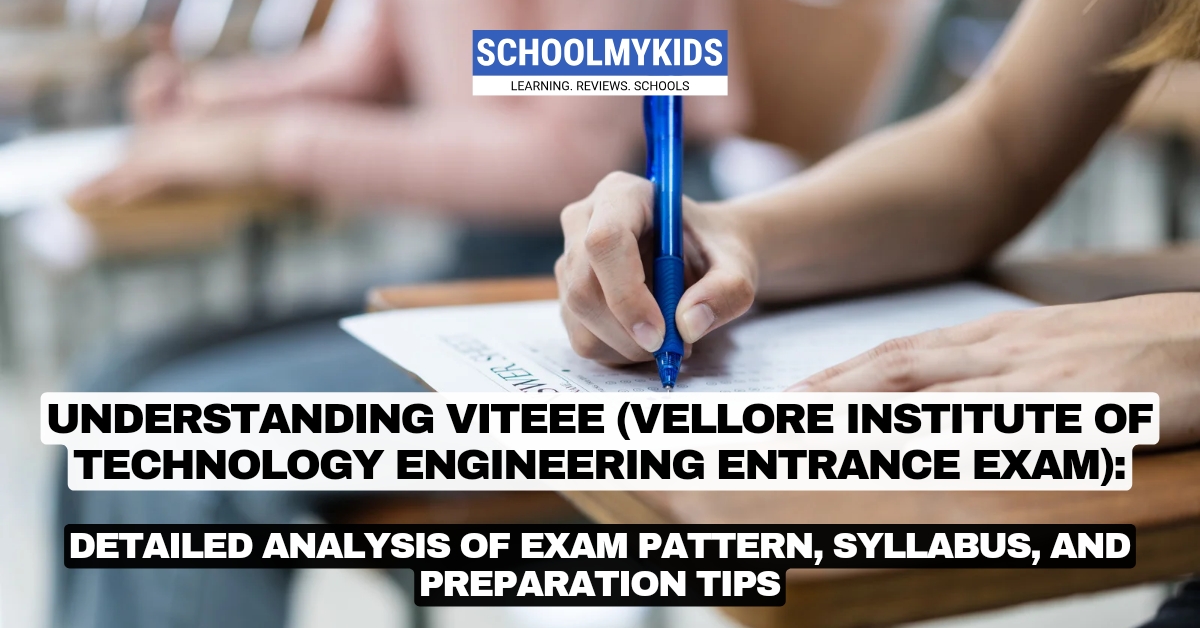The Vellore Institute of Technology Engineering Entrance Exam (VITEEE) is a national-level entrance examination conducted by VIT University for admission to its undergraduate engineering programs. This article provides a comprehensive overview of the VITEEE exam pattern, detailed syllabus, essential preparation tips, and resources for effective study.
Overview of VITEEE Exam
Purpose of VITEEE: VITEEE is designed to evaluate the knowledge and aptitude of candidates aspiring to join the undergraduate engineering programs offered by VIT campuses in Vellore, Chennai, Amaravati, and Bhopal.
Importance of Understanding the Exam Pattern: Understanding the VITEEE exam pattern helps candidates plan their preparation strategically, manage time efficiently during the test, and enhance their chances of securing a high score.
VITEEE Exam Pattern
Exam Mode:
- VITEEE is conducted in online mode (Computer-Based Test).
Subjects:
- The exam comprises five sections: Physics, Chemistry, Mathematics/Biology, English, and Aptitude.
Type of Questions:
- The question paper includes Multiple Choice Questions (MCQs).
Medium of Exam:
- The exam is conducted in English.
Duration of Exam:
- The total duration of the exam is 2 hours and 30 minutes.
Total Marks:
- The maximum marks for VITEEE are 125.
Marking Scheme:
- Each correct answer awards 1 mark.
- There is no negative marking for incorrect answers.
VITEEE Detailed Question Paper Design
Example of VITEEE Question Distribution:
| Section | Number of Questions | Total Marks |
|---|---|---|
| Physics | 35 | 35 |
| Chemistry | 35 | 35 |
| Mathematics/Biology | 40 | 40 |
| English | 5 | 5 |
| Aptitude | 10 | 10 |
| Total | 125 | 125 |
Detailed VITEEE Syllabus
Physics:
- Laws of Motion & Work, Energy, and Power
- Properties of Matter
- Electrostatics
- Current Electricity
- Magnetic Effects of Electric Current
- Electromagnetic Induction and Alternating Current
- Optics
- Dual Nature of Radiation and Atomic Physics
- Nuclear Physics
- Semiconductor Devices and their Applications
Chemistry:
- Atomic Structure
- p,d, and f-Block Elements
- Coordination Chemistry and Solid State Chemistry
- Thermodynamics, Chemical Equilibrium, and Chemical Kinetics
- Electrochemistry
- Isomerism in Organic Compounds
- Alcohols and Ethers
- Carbonyl Compounds
- Carboxylic Acids and their derivatives
- Organic Nitrogen Compounds and Biomolecules
Mathematics:
- Matrices and their Applications
- Trigonometry and Complex Numbers
- Analytical Geometry of Two Dimensions
- Vector Algebra
- Analytical Geometry of Three Dimensions
- Differential Calculus
- Integral Calculus and its Applications
- Differential Equations
- Probability Distributions
- Discrete Mathematics
Biology (for B.Tech Bio Stream candidates):
- Taxonomy
- Cell and Molecular Biology
- Reproduction
- Genetics and Evolution
- Human Health and Diseases
- Plant Physiology
- Biochemistry
- Human Physiology
- Biotechnology and its Applications
- Biodiversity, Ecology, and Environment
English:
- Comprehension
- Grammar
- Pronunciation
- Vocabulary
- Reading and Writing Skills
Aptitude:
- Data Interpretation
- Data Sufficiency
- Syllogism
- Number Series, Coding, and Decoding
- Clocks, Calendars, and Directions
Preparation Strategy
Understanding the Exam Pattern:
- Familiarize yourself with the exam structure, marking scheme, and question distribution to plan your preparation effectively.
Focus on Fundamentals:
- Strengthen your basics in Physics, Chemistry, Mathematics/Biology, English, and Aptitude.
Practice Previous Years’ Papers:
- Solve previous years’ question papers to understand the exam trend and difficulty level. This helps in identifying important topics and improving time management.
Take Mock Tests:
- Regularly take mock tests to simulate the exam environment, assess your preparation level, and identify areas that need improvement.
Effective Time Management:
- Allocate specific time slots for each section and stick to the schedule. Practice time-bound solving to enhance speed and accuracy.
Recommended Resources
Free Study Materials:
- NCERT textbooks (Classes 11 and 12) for Physics, Chemistry, and Mathematics/Biology.
- Standard reference books for each subject.
YouTube Channels:
- Khan Academy: Offers detailed explanations and interactive sessions.
- Byju’s: Provides comprehensive video lectures on core concepts.
- Unacademy: Features expert-led sessions and problem-solving tutorials.
Conclusion
Preparation Strategy:
- Understanding the exam pattern, focusing on fundamentals, practicing previous years’ papers, and taking regular mock tests are key to excelling in VITEEE.
Resources:
- Utilize free study materials and educational YouTube channels to strengthen your preparation.
FAQs
Common Queries about VITEEE:
Q: What type of questions are asked in VITEEE?
A: VITEEE comprises Multiple Choice Questions (MCQs) that test the candidate’s knowledge in Physics, Chemistry, Mathematics/Biology, English, and Aptitude.
Q: What is the marking scheme of VITEEE?
A: Each correct answer awards 1 mark, and there is no negative marking for incorrect answers.
Q: How important is the NCERT syllabus for VITEEE?
A: The NCERT syllabus forms the core of the Physics, Chemistry, and Mathematics/Biology sections. Thorough understanding and revision of NCERT textbooks are crucial for scoring well in the exam.
Q: Are there any limits on the number of attempts for VITEEE?
A: There is no specified limit on the number of attempts for VITEEE. Candidates can appear for the exam as long as they meet the eligibility criteria.
Q: How can I manage time effectively during the VITEEE exam?
A: Practice time-bound solving of previous years’ papers and take regular mock tests to enhance your speed and accuracy. Allocate specific time slots for each section and stick to the schedule during the exam.








Be the first one to comment on this story.